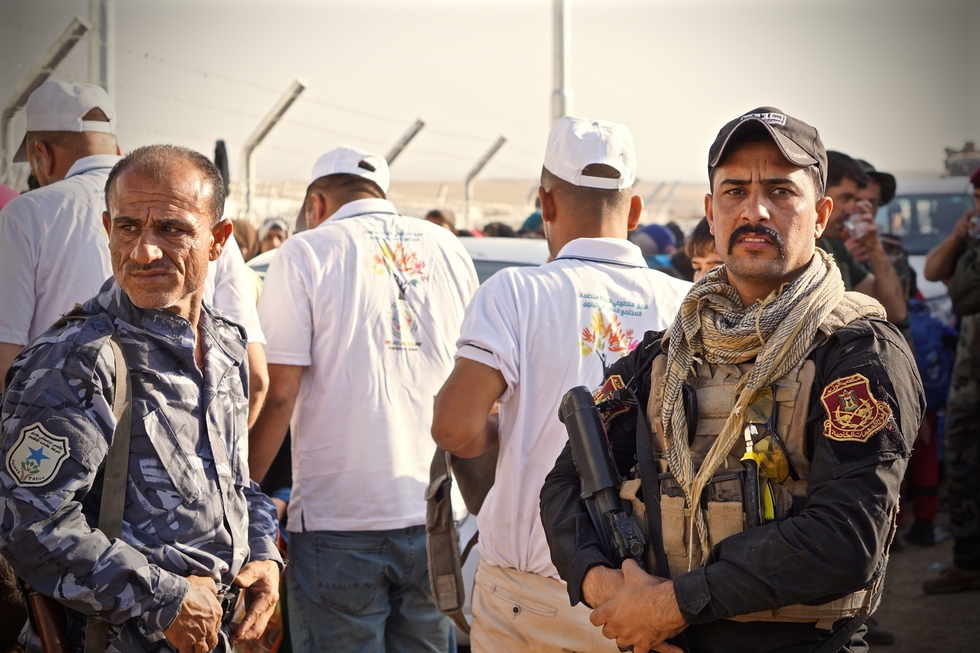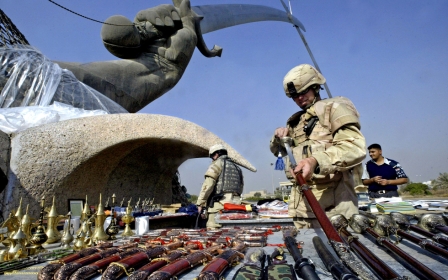Opting out of human rights laws could increase military abuses

In war, it is impossible to rule out the possibility of civilian casualties. For this reason, the Geneva Conventions were agreed upon in 1949 to protect those not taking part in armed conflict and limit the barbarity of conflict.
Should any actor break these conventions, they could subject to trial for war crimes. Crimes not covered by international humanitarian law are referred directly to the country from which the troops originate.
According to the Iraqi Body Count project, which many say is a gross underestimate of the true number of Iraqi citizens killed, the US-led invasion of Iraq in 2003 has directly resulted in more than 165,000 deaths to date.
Following armed conflict, any significant peacebuilding efforts and reconciliation processes must include a process of transitional justice to offer sustainable peace.
Scholars and those involved in peacebuilding efforts after multiple conflicts throughout recent history, including those in Rwanda, Liberia and the Baltics, have repeatedly highlighted the importance of these means of justice.
In his 2006 book Insurgency and Counter-Insurgency in Iraq, Ali Hashim, an associate professor at the Rajaratnam School of International Studies, highlights how violence in Iraq increased as some Iraqis experienced crimes committed by the occupying forces in what turned into a vicious cycle of increasing conflict.
It is no secret that coalition forces committed significant crimes during the occupation of Iraq between the years of 2003 and 2011.
The most notable were those committed by American forces in the Abu Ghraib prison, with accusations of violations including rape, physical abuse, sexual abuse, torture and murder.
With many of the crimes documented on video and in photographs, there was a massive outcry in the media and among human rights groups. But only 11 American soldiers, were eventually convicted in US military courts, the majority of whom escaped with minor sentences.
'Industry of vexatious claims'
British troops were not an exception. Stationed mainly in the south of Iraq in the oil-rich town of Basra, the British Army was responsible for maintaining security in the region until the last soldiers withdrew in 2011.
As recently as September, during a hearing of the Iraq Fatality Investigations (IFI), which is conducting a series of inquiries into Iraqi civilian deaths, former British soldiers based in Basra were condemned for their role in the drowning of 15-year-old Ahmed Jabbar Kareem Ali in 2003.
Former British soldiers based in Basra were condemned for their role in the drowning of 15-year-old Ahmed Jabbar Kareem Ali
The findings of the IFI, which was launched in 2013 and is not concerned with determining criminal or civil liability, came after a British court acquitted the soldiers of manslaughter in 2006.
In 2010, to handle the large number of Iraqi accusations of abuse by British armed forces, the government set up the Iraq Historic Allegations Team (IHAT) to investigate each claim of human rights abuse. IHAT can refer cases on to criminal courts.
Almost 1,500 allegations of unlawful killings and mistreatment of Iraqi citizens are being investigated by the team.
In October 2016, UK Prime Minister Theresa May, in one of her first acts as PM, announced plans for the UK military to opt out of the European convention on human rights.
This dangerous motion would theoretically confine human rights laws to the borders of the British Isles, putting both foreign civilians and British troops at risk of abuse.
The move, according to May, is to protect British troops from an “industry of vexatious claims that has pursued those who served in previous conflicts”.
May’s rhetoric was echoed by Sir Michael Fallon, the defence secretary, referring to it as a “legal witch hunt” by law firms. May expects that new laws will reduce the amount of money paid out by the British government on investigating allegations and protect soldiers from psychological trauma following return from the battlefield.
'You could basically kill whoever you wanted'
Since 2004, the British government has spent approximately £100m in investigations and compensation for Iraqi allegations, a mere fraction of the overall spending on the Iraq war and the impact that the war had on Iraqi citizens, a price they are still paying today.
The shift to add a layer of protection for British troops was first initiated in January 2016 by the then prime minister David Cameron, who proposed “penalties against firms found to be abusing the system” as a deterrent against “spurious” allegations.
The potential to be persecuted for an allegation could hypothetically deter genuine claims of crimes by Iraqis.
The British government has spent approximately £100m in investigations and compensation for Iraqi allegations
But reducing the potential of allegations against the British Army could also result in increased freedoms for soldiers in the army to do as they please.
Jody Casey, a US veteran from the 2003 Iraq war, highlighted how soldiers did so. “When we first got down there,” he told Newsnight, “you could basically kill whoever you wanted, it was that easy.”
Layer of accountability
The possibility of litigation adds a layer of accountability and helps improve the code of conduct. The priority should be to improve the actions of the soldiers on the battlefield to reduce abuses and so reduce the likelihood of eventual prosecutions.
The military is not uniquely threatened by the risk of litigation. The medical profession is similar, with numerous spurious claims affecting the reputation and mental health of doctors.
According to Professor Steven Eastaugh, former health adviser to President Barack Obama, the medical profession has, however, evolved to improve medical care to reduce litigation.
The double standards, however, can be seen more clearly when applied to other armed forces.
Abuses in fight for Mosul
Even prior to the start of the battle to recapture Mosul, analysts repeatedly warned - and continue to warn - of the risk of sectarian war crimes by the Iraqi Special Operations Forces (ISOF) or Popular Mobilisation Forces (PMF).
Human rights groups and aid activists discussed the potential for war crimes at large, resulting in the watchful eyes of the world focusing on the ISOF for signs of any misconduct.
Constant monitoring of the Iraqi army will promote accountability and better treatment of those living in Iraq’s newly liberated territories. This comes at a moment when, for the first time in the recent history of Iraq, all sects including Sunni, Shia, Christians and Kurds have united in a joint effort for the liberation of Mosul.
Nonetheless, recent developments in the US appear to take advantage of litigation for compensation from countries promoting terror.
Recent advancements in the US appear to take advantage of litigation for compensation from countries promoting terror
In what was dubbed the September 11 bill, the Justice Against Sponsors of Terrorism Act (JASTA), passed in September, allows victims of the 9/11 attacks to sue Saudi Arabia for their alleged role in the attacks.
This does not exclude the possibility that the US too could be sued for its role in making Iraq unstable, with many analysts suggesting that Iraq will use the bill to demand compensation for the outcomes of the US-led invasion in 2003.
In war there are victims on both sides of the conflict. Since 2003, Iraq has not seen a period of sustained peace, with civilians dying on a daily basis.
The insecurity from 2003 to 2011 resulted in many coalition force soldiers committing frequent human rights abuses in Iraq. But lifting the constraints of human rights laws on troops could result in even larger mistakes in future conflicts than those already made.
- Ahmed Twaij is a British doctor, born to Iraqi parents, currently researching in Iraq for a Masters in Global Health with Conflict, Security and Development from King's College London. He is also a freelance writer and photojournalist. He is a curator of EverydayIraq online photography blog. You can follow him on Twitter @twaiji
The views expressed in this article belong to the author and do not necessarily reflect the editorial policy of Middle East Eye.
Image: A soldier from Iraq's Golden Division, who are under the watchful eye of the media, escorts IDPs to Hassanshama a refugee camp outside Mosul (Ahmed Twaij)
Stay informed with MEE's newsletters
Sign up to get the latest alerts, insights and analysis, starting with Turkey Unpacked
Middle East Eye delivers independent and unrivalled coverage and analysis of the Middle East, North Africa and beyond. To learn more about republishing this content and the associated fees, please fill out this form. More about MEE can be found here.






